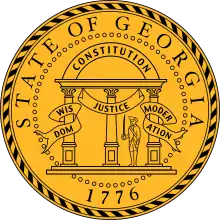Rufus Bullock
Rufus Brown Bullock (March 28, 1834 – April 27, 1907) was a Republican Party politician and businessman in Georgia. During the Reconstruction Era he served as the state's governor and called for equal economic opportunity[2] and political rights for blacks and whites in Georgia. He also promoted public education for both, and encouraged railroads, banks, and industrial development. During his governorship he requested federal military help to ensure the rights of freedmen; this made him "the most hated man in the state", and he had to flee the state without completing his term.[1] After returning to Georgia and being found "not guilty" of corruption charges, for three decades afterwards he was an esteemed private citizen.
Rufus Bullock | |
|---|---|
 | |
| 46th Governor of Georgia | |
| In office July 4, 1868 – October 30, 1871 | |
| Preceded by | Thomas H. Ruger |
| Succeeded by | Benjamin F. Conley |
| Personal details | |
| Born | March 28, 1834 Bethlehem, New York, U.S. |
| Died | April 27, 1907 (aged 73) Albion, New York, U.S. |
| Political party | Republican |
| Military service | |
| Allegiance | |
| Branch/service | |
| Rank | |
| Unit | Quartermaster's Office |
| Battles/wars | American Civil War |
Early life
Bullock was born in Bethlehem, New York and moved to Augusta, Georgia, in 185y Press|location=London|isbn=9780521806367}}</ref>
Political life
Bullock served as the 46th Governor of Georgia from 1868 to 1871 during Reconstruction and was the first Republican governor of Georgia. After Georgia ratified the Fourteenth Amendment to the Constitution, the Omnibus Act declared that states were entitled to representation in Congress as one of the states of the Union. Georgia again lost the right to representation in Congress because the General Assembly expelled twenty-eight black members and prevented blacks from voting in the 1868 presidential election (see Original 33).[3] In response to an appeal from Bullock, Georgia was again placed under military rule as part of the Georgia Act of December 22, 1869.[4] This made Bullock a hated political figure. After various allegations of scandal and ridicule,[5] in 1871 he was obliged by the Ku Klux Klan to resign the governorship, and felt it prudent to leave the state.[1] He was succeeded by Republican State Senate president Benjamin Conley, who served as Governor for the two remaining months of the term to which Bullock had been elected. Conley was succeeded by James M. Smith, a Democrat, and no Republican would serve as governor of Georgia again until Sonny Perdue in 2003.
Postbellum life
Bullock served as president of the Macon and Augusta Railroad in 1867, and established the Augusta First National Bank. He later became president of the Atlanta Chamber of Commerce, and in 1895 served as master of ceremonies for the Cotton States and International Exposition.[6] Bullock introduced the speaker, Booker T. Washington,[7] who gave his famous "Atlanta Compromise" speech.
Death and legacy
Bullock died in [[ He is the only governor of Georgia s Georgia State Capitol.
In books
The novel Gone With the Wind, by native Georgian Margaret Mitchell, references the election of Rufus Bullock at the end of Part Four, calling it the end of a process of Northern subjugation of Georgia that had begun with Sherman's March to the Sea in 1864. In the novel, the Republicans win the election, utilizing voter fraud with the help of their Negro (freed slaves) constituency. According to Mitchell, "The election had lasted three days instead of one. Trainloads of negroes had been rushed from town to town, voting at every precinct along the way. Of course, Bullock had won."
References
- Duncan, Russell. "Rufus Bullock (1834-1907)". New Georgia Encyclopedia. Retrieved 28 March 2018.
- Hume, Richard L. (2008). Blacks, Carpetbaggers, and Scalawags : The Constitutional Conventions of Radical Reconstruction. Baton Rouge: Louisiana State University Press. p. 122. ISBN 9780807148341.
- Smith, W. Calvin (1968). "The Reconstruction 'Triumph' of Rufus B. Bullock". The Georgia Historical Quarterly. 52 (4): 414–425. JSTOR 40578901.
- Stathis, Stephen W. (2014). Landmark Legislation, 1774-2012 : major U.S. acts and treaties (2nd ed.). Washington: CQ Press. p. 119. ISBN 9781452292304.
- Baker, Bruce E.; Kelly, Brian (2013). After slavery : race, labor, and citizenship in the reconstruction South. Gainesville: University Press of Florida. p. 60. ISBN 9780813044774.
- Harvey, Bruce G. (2014). World's Fairs in a Southern Accent : Atlanta, Nashville, and Charleston, 1895–1902. Knoxville: University of Tennessee Press. p. 134. ISBN 9781572338654.
- Perdue, Theda (2010). Race and the Atlanta Cotton States Exposition of 1895. Athens: University of Georgia Press. p. 7. ISBN 9780820342016.
Further reading
- Entrepreneur for Equality: Governor Rufus Bullock, Commerce, and Race in Post-Civil War Georgia (1994), Russell Duncan, University of Georgia Press, ISBN 0-8203-1557-5.
External links
- Georgia State Archives Roster of State Governors.
- Georgia Governor's Gravesites Field Guide (1776-2003).
- 1834 March 28 article in This Day in Georgia History compiled by Ed Jackson and Charles Pou.
- National Governors Association page
| Party political offices | ||
|---|---|---|
| First | Republican nominee for Governor of Georgia 1868 |
Vacant Title next held by D. Walker |
| Political offices | ||
| Preceded by Charles J. Jenkins |
Governor of Georgia 1868–1871 |
Succeeded by Benjamin F. Conley |
